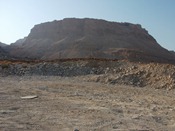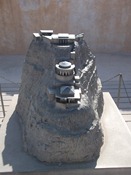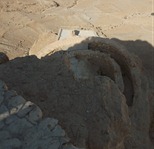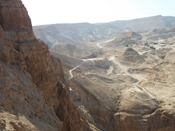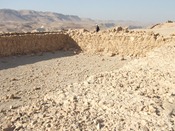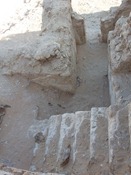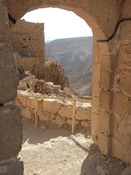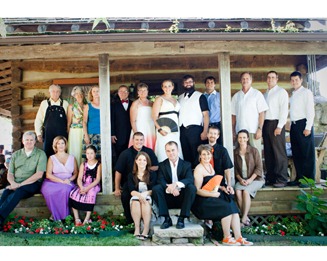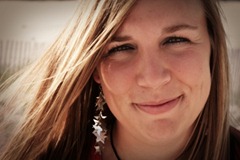 So if you didn’t know, today is my wife, Amanda’s 25th birthday. It’s her ‘Golden Birthday’, which is when you turn the age that is the same number as the day of your birthday (so, 25 on the 25th). In honor of this special occasion, I present to you 25 reasons I love my wife (in no particular order).
So if you didn’t know, today is my wife, Amanda’s 25th birthday. It’s her ‘Golden Birthday’, which is when you turn the age that is the same number as the day of your birthday (so, 25 on the 25th). In honor of this special occasion, I present to you 25 reasons I love my wife (in no particular order).
1. She’s a reader. I love that both of us read a lot. She is always reading something – usually that I haven’t read. It makes for some great discussions, and we can kill hours in a bookstore together.
2. She has great style. One of our first conversations revolved around our mutual love for Chuck Taylors. She has a unique fashion sense that means she always looks great and probably different from anyone else in the room. In the best way.
3. She is a people person. We’re both super-extroverted, so she loves having a housefull of guests as much as I do. She’s wonderful with people and has never met a person she couldn’t make into a friend.
4. She’s smoking hot. But I don’t have to tell you that. Clearly she is the hottest woman on the planet. Sorry, fellas!
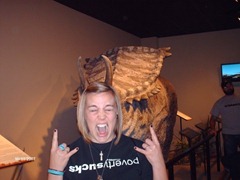 5. She listens to great music. We have the same taste in music, more or less, and she’s always up for heading to a show with me, or picking up a new CD from one of our favorite bands. She only sings along when I do too, because I sing way louder. But it’s still fun.
5. She listens to great music. We have the same taste in music, more or less, and she’s always up for heading to a show with me, or picking up a new CD from one of our favorite bands. She only sings along when I do too, because I sing way louder. But it’s still fun.
6. She loves coffee. This is good because we work at a coffee shop, but also because we can drink it together in the mornings.
7. People like her better than me. No exaggeration, and no lie. I have a tendency to be too blunt and not very compassionate. She balances me very well in that regard. And I think it’s pretty awesome how much everyone loves her.
8. She is a great leader. She quickly earns the right to speak truth into other people’s lives, and she does so with grace and gentleness. It’s quite a thing to watch, and she inspires fierce loyalty in those she calls friends.
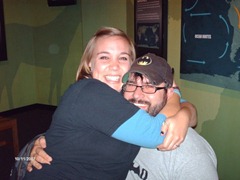 9. She thinks about stuff from a theological perspective. Even though she’s not formally trained in theology like me and a lot of my friends are, she doesn’t hold back from jumping into a conversation and offering her thoughtful opinion. She does a great job of considering all aspects of an issue, and she offers really practical advice. Speaking of which…
9. She thinks about stuff from a theological perspective. Even though she’s not formally trained in theology like me and a lot of my friends are, she doesn’t hold back from jumping into a conversation and offering her thoughtful opinion. She does a great job of considering all aspects of an issue, and she offers really practical advice. Speaking of which…
10. She is always very practically minded. At the end of the day, I’ve typically been content to contemplate abstract and detached theological ideas. Amanda is always concerned with how this changes our lives in the here and now, how we can put something into practice. She has taught me a lot about how to make the Scriptures and my faith more real.
11. She listens to my sermons at least 4 times. By the time I preach a sermon, I’ve usually talked it through at least 4 times. And usually Amanda has heard most of those practices, offering me critiques and feedback to make my talk more focused and practical.
12. She gives great feedback. Yup… like I just said, her feedback is really good. It’s thoughtful and helpful. My talks are always better after I’ve given them for her, and she does a great job of helping me come up with solid, concrete content that relates better.
13. She’s fluent in Spanish. Like for real fluent. Remember how I said people love her? You should see her in a Spanish-speaking country. At least 3 different people told her her Spanish was better than theirs. She’s truly a marvel to watch in action.
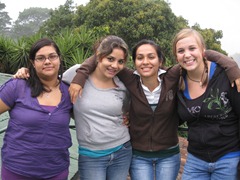 14. She loves to travel. You know how she got fluent in Spanish? By living in Spain. Oh yeah, and Mexico. And El Salvador. And she’s going to Honduras twice this year. I love that she loves to travel so much.
14. She loves to travel. You know how she got fluent in Spanish? By living in Spain. Oh yeah, and Mexico. And El Salvador. And she’s going to Honduras twice this year. I love that she loves to travel so much.
15. She plays Guitar Hero. She doesn’t play a lot of video games, but she does play Guitar Hero like a fiend. And she’s just bumped up to Hard for a couple of songs, so watch out world. The only thing better than rocking out at a concert together is rocking out in our TV room together.
16. She enjoys Sci-Fi. She has a soft spot for Star Trek and we watched (and loved) Battlestar Galactica together, and discussed it much. That is way hot.
17. She’s adventurous. If you haven’t picked up on this by now, she’s the first one out the door when it’s time to explore Dayton or drive across the country to visit a friend. We’re rarely ever home.
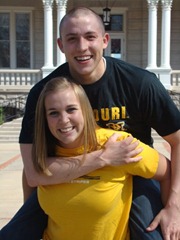 18. She loves her family. She has a huge extended family, and most of them live in the immediate vicinity of St. Louis, so they’re all very close. It’s a lot of fun to hang out with all of them, and – no shocker here – they all love her quite a lot.
18. She loves her family. She has a huge extended family, and most of them live in the immediate vicinity of St. Louis, so they’re all very close. It’s a lot of fun to hang out with all of them, and – no shocker here – they all love her quite a lot.
19. She has tattoos. Not just a couple, but lots. And she’s working on her 3/4 sleeve right now, which is blowing my mind.
20. She loves going to concerts. And she loves getting in the Pit. This is important.
21. She does hair for fun. If you’ve never had Manda work on your hair, you don’t know what you’re missing. For real. This is one of her many forms of artistic expression.
22. She disciples really well. If you haven’t figured it out by now, people are drawn to Manda, and she is always on the lookout for younger persons to mentor. She does a great job of helping them to discover how to live in the story of the Gospel.
23. She serves better than anyone I know. She is up and serving before most other people have even figured out there’s a need. I love doing things like Target: Dayton with her, but she has an eye for the little, everyday needs that escape me. She’s incredible!
24. She uses technology without being addicted to it (blogs, TomTom, etc.). While I have a gadget addiction, Amanda is a lot more balanced. She can use pieces of tech for what they do well without becoming obsessed with them (read: unlike me). She is a great check for me in my gadget obsessions.
25. She has the Sermon on the Mount memorized. Before she started on her 3/4 sleeve (which is Sermon on the Mount-themed), she decided to memorize the whole thing (Matthew 5-7) and spent a couple of months diligently doing so. I’m blown away. Impressed and in awe. She’s so awesome!
There you have it… 25 of the 100s of reasons I love my wife. And what about you? What do you love about Amanda?
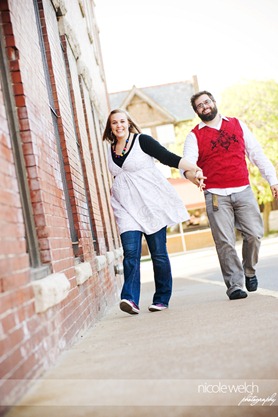
 How do I live a life worthy of my calling?
How do I live a life worthy of my calling? 2. Move past the past and lean into the future.
2. Move past the past and lean into the future.